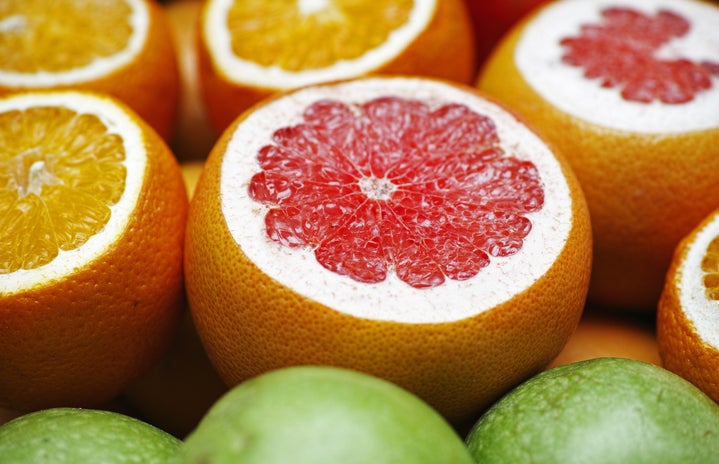Earlier this year, I decided to finally schedule an appoint with a dermatologist and figure out a plan for dealing with my acne. Even though my acne has never been particularly severe, it can still be really, really painful, and it’s always made me feel needlessly insecure; this is a sentiment I’ve found a lot of teenagers with regular, hormonal acne share.
Going to see an actual doctor about it felt pretty daunting at first, but I expressed my concerns to a dermatologist, and I ended up learning a lot of valuable information about acne and the different ways to treat it.
My dermatologist examined my skin, gave me a few tips regarding skin care, and wrote me a prescription for a topical called Epiduo Forte: a once-daily medication that I would apply all over my face every other day for two weeks, and then every day after that. Epiduo, like many other prescription acne topicals, contains benzoyl peroxide (2.5%), a medication which fights acne-inducing bacteria in the skin, as well as a retinoid called adapalene (0.3%), which works to decrease inflammation and swelling.
The first couple of applications went fine, but it didn’t take long for me to really start seeing the effects of such strong chemicals on my skin. I had broken out all over, and my skin was so red and dry that I looked like I’d gotten a terrible sunburn. I couldn’t even cover up the redness with makeup because my concealer kept cracking apart on top of the dry skin.
This isn’t just the case for Epiduo; most topicals, particularly retinoids, are designed to purge your skin of all the bad bacteria, which fosters a sort of “it’ll get worse before it gets better” scenario. But even though so many people claimed Epiduo was worth the pain, saying after three months my skin would look clearer than ever, I knew I couldn’t handle it. I wanted to look and feel my best, and there was nothing I could do to reason that clear skin was worth several months of such incredibly intense anxiety.
Needless to say, I gave up on Epiduo after about two weeks. Despite the fact that I didn’t get much out of the treatment itself, though, I still learned a lot about what’s actually good for our skin, and what isn’t.
Because Epiduo works best by itself, I stopped using any other products I’d bought aside from my bar of Cerave soap and my moisturizers. I never stopped to think that maybe all of those chemicals were contributing to my breakouts, but after I went a month without using anything but facial wash and moisturizers, I saw an incredible improvement in my skin.
I have dry-to-normal, very sensitive skin, and as of today, I only use four skin care products: CeraVe’s Hydrating Cleansing Bar, CeraVe’s PM Facial Moisturizer, Cetaphil’s Daily Facial Moisturizer (SPF 15), and the Mario Badescu Rosewater Facial Spray. (The latter product is literally the only thing I have ever written a review for. That’s how much I love it.) I wash my face every night with the cleansing bar, spray my skin with the facial spray, and then apply the PM moisturizer; in the morning, I spray my skin again, then apply the Cetaphil moisturizer.
Here’s the thing: when your skin is breaking out, it could be due to a bunch of different variables (just a few of which are linked here). So, how do you figure out which factor is affecting your skin the most? For me, visiting a doctor and purging my skin care routine helped me really understand what was causing my acne. Doctors might not always be able to help you “solve” the issue, but they can usually help you identify what exactly is going on with your body.
Here are some of the top tips that I learned from my dermatologist, other people’s anecdotes, and my own experiences/research:
- Don’t hesitate to see a dermatologist, even if your acne “isn’t that bad.” It’s their job to help you with your skin no matter how serious the problem is. I only ever went to one appointment, and I feel like I got so much out of it.
- There are several different types of medications your doctor can prescribe for you, including topical products, oral products, birth control, and even skin therapies. You can work with your dermatologist to figure out which one(s) would work best for you depending on the type of acne you have and what you want to get out of medication
- Face-mapping can also help you identify root causes of your acne using similar methods to those that a dermatologist would use for mild/moderate acne if for some reason you can’t get to a doctor.
- Purge your skin care products and start from scratch. My dermatologist told me to avoid using any products that specifically advertise they’re for acne, because they’re usually way too harsh for your skin, and they only introduce your skin to dozens of unnecessary chemicals. She agrees that Cerave and Cetaphil are both great brands for sensitive skin because of how gentle they are.
- If you do decide to incorporate other products into your routine aside from facial wash and moisturizer, ease them in one at a time. Your skin might break out because it’s been thrown off by new chemicals, which is totally normal; if it doesn’t clear up after a month, toss the new product out of your routine.
- Do. Not. Pop. Your. Pimples. We all know it’s bad, and yet we do it anyway. If you really can’t resist it, make sure you take care of the area before and after. Wash your hands so you don’t introduce any outside bacteria. Ointments can clog your pores, so just apply a little bit of Neosporin right on top of the popped pimple. Don’t try to pop it again, and definitely don’t pick at the scab; if it starts to bleed, you’ve gone too far.
- Try acne-friendly makeup. Makeup probably isn’t the biggest culprit of your breakouts, but it can certainly contribute to your acne if your skin is sensitive. Oil-free makeup that contains salicylic acid (an acne-fighting ingredient) might be your best bet if you think your makeup is causing problems; you might want to check out this list of products that are considered to be rather beneficial for your skin.
Acne really, really sucks, but there are definitely steps you can take to reduce your breakouts, or possibly get rid of them completely. Even though my experience with a prescription topical wasn’t the best, thousands of people have benefited from products like Epiduo as well other prescription medications. Just figure out what works for you; it’s taken me years of trial and error to find a routine that really works for me, but I can say with complete honesty: clear skin was absolutely, 100% worth the time and energy I put into it.


